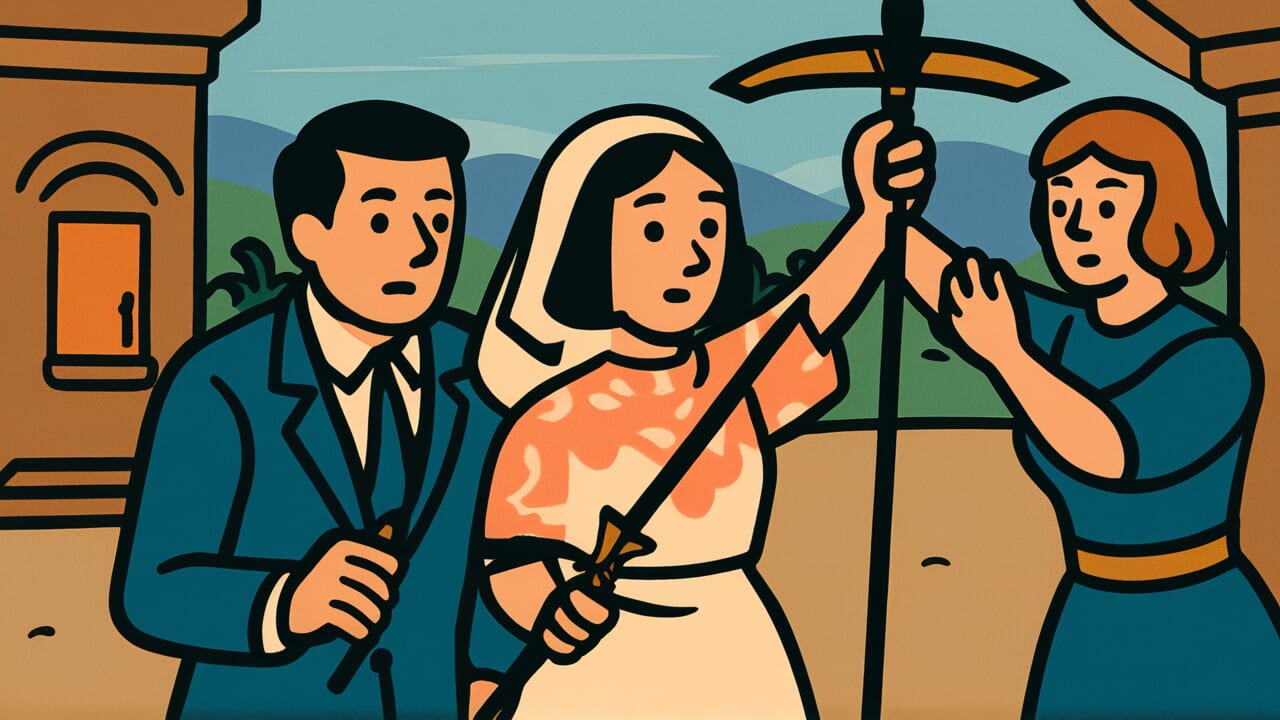How to Read “A master’s quarrel starts with his spear-bearer”
Danna no kenka wa yarimochi kara
Meaning of “A master’s quarrel starts with his spear-bearer”
This proverb describes a situation where servants take action before their masters do in a quarrel between the masters themselves.
The actual parties to the dispute are the masters. Yet somehow, the servants around them resort to force first.
This expression is used when the normal order of things gets reversed. It applies when people who aren’t directly involved jump ahead and act first.
The proverb warns against situations where emotions run high or bystanders overreact. This causes events to unfold differently than they should.
The customs of samurai society are long gone. But the phenomenon of “bystanders jumping ahead” still happens today.
When organizational leaders clash, their subordinates often fight more fiercely first. This is exactly what the proverb describes.
Origin and Etymology
The exact first written appearance of this proverb is unclear. However, it likely reflects life in samurai society during the Edo period.
“Danna” originally means master or employer. “Yarimochi” refers to a type of servant who carried spears for samurai.
These spear-bearers accompanied their masters on outings. In samurai society, traveling with multiple servants was common practice to display the master’s prestige.
The proverb emerged from the unique power dynamics of master-servant relationships. When masters argued, the masters themselves should have confronted each other directly.
But in reality, the accompanying servants often struck first. This happened frequently enough to become noteworthy.
Why did this occur? Servants may have acted from loyalty, wanting to protect their master’s honor.
They might have sensed their master’s anger and tried to act preemptively. Also, high-ranking masters hesitated to act directly due to their status.
Meanwhile, servants had no such reservations. This social dynamic was unique to samurai culture.
An expression capturing this phenomenon gradually became widely used.
Usage Examples
- The disagreement was between department heads, but like “a master’s quarrel starts with his spear-bearer,” their subordinates became hostile first
- The CEOs are still exploring room for negotiation, but it’s a case of “a master’s quarrel starts with his spear-bearer”—the field staff are deepening their conflict
Universal Wisdom
This proverb captures the subtle dynamics of human relationships and the universal truth of emotional chain reactions.
Why do people who aren’t directly involved act first? Essential human psychology is at work here.
Those who serve a master try to anticipate and act ahead of their master’s wishes. When they sense their master’s anger or frustration, they take it personally.
They become even more emotional than the master himself. This shows loyalty, but it also means losing composure.
Meanwhile, the masters themselves feel restraint due to their position. They understand the gravity of direct confrontation and must be cautious.
But those around them don’t bear this burden. So they act more boldly, sometimes even recklessly.
This structure exists across time. Leaders choose words carefully out of diplomatic consideration, while supporters resort to extreme rhetoric.
Executives explore possibilities for cooperation, while workers on the ground deepen conflicts. Those who don’t carry the weight of being actual parties tend to jump ahead more easily.
The proverb sharply perceives this human tendency.
Our ancestors understood this wasn’t mere coincidence. It’s a pattern that repeats throughout human society.
That’s why this proverb has been passed down as a warning.
When AI Hears This
When spear-bearers start the fight first, the master has only two choices left: “abandon the subordinates and flee” or “join the battle.”
This is a classic example of what game theory calls a “commitment device.” You intentionally reduce your own options to make the opponent think “this person is serious.”
Nobel Prize-winning economist Thomas Schelling gave a famous example. In a chicken game where two cars race toward a cliff, what happens if one driver throws the steering wheel out the window in front of the opponent?
The side that threw away the wheel enters a “can’t stop anymore” state. But the opponent who sees this has no choice but to swerve.
The side that lost freedom wins. It’s a paradox.
The spear-bearer’s jumping ahead has the same structure. Once subordinates enter combat, the master is forced into a “can’t back down” position.
This constraint itself becomes negotiating power. The opponent calculates “that master absolutely won’t back down in front of his subordinates.”
This actually increases the probability that the other side will concede.
Similar phenomena occur in modern labor negotiations. When unions announce a strike in advance, union leaders can claim “we can’t stop the workers now” during negotiations with management.
Tying your own hands becomes the strongest negotiating card. People in Edo-period Japan perceived this sophisticated strategic logic through everyday observation.
Lessons for Today
This proverb teaches us the importance of constantly questioning whether we’re truly the actual party involved.
The feeling of getting angry for someone else or fighting for someone else is noble. But if you get swept up in that emotion and jump ahead, you might narrow the actual party’s options.
You could make the situation worse. What truly helps the other person isn’t reacting emotionally.
It’s calmly assessing the situation and supporting the actual party in making the best judgment.
At work and at home, we sometimes stand in the “spear-bearer” position. We hear our boss’s complaints, listen to family grievances, and share a friend’s anger.
In such moments, step back and think. Will the situation really improve if you act first?
What does the actual party want? Someone to fight in their place, or someone to listen calmly?
Your passion and ability to act are wonderful strengths. But by choosing the right timing to use that power, you can create even greater value.
Sometimes waiting or stepping back is also a courageous choice.



Comments